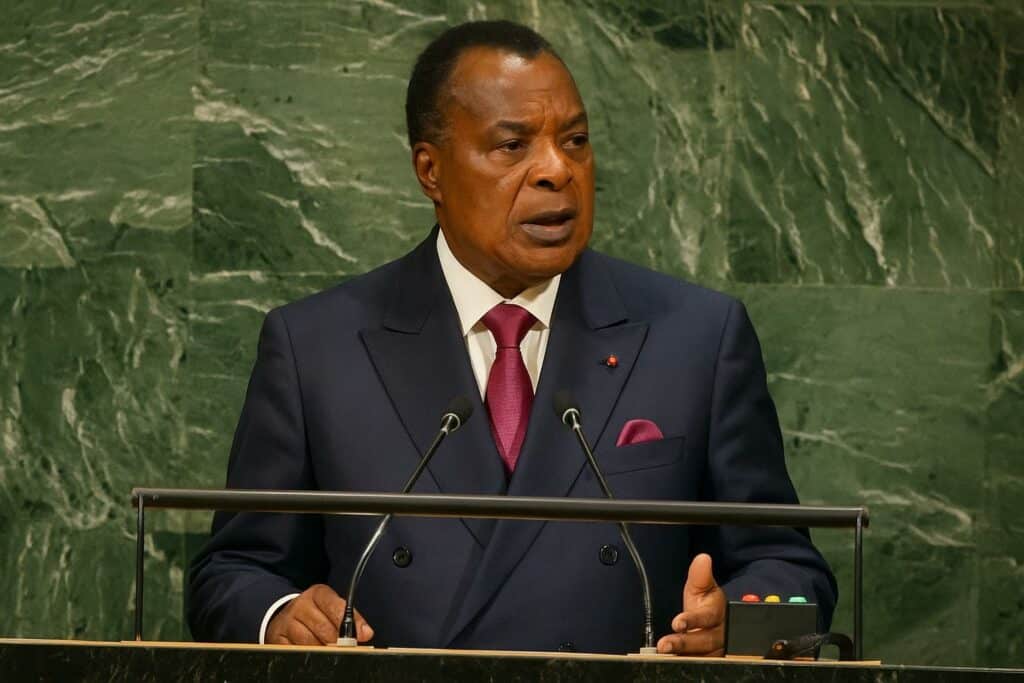A landmark address at the 80th UNGA
President Denis Sassou Nguesso walked to the famous green marble rostrum of the United Nations on 24 September 2025, carrying both the gravitas of a seasoned statesman and the conciliatory tone that has marked Brazzaville’s diplomacy since the early 1990s. Speaking to an audience of heads of state, diplomats and observers, he declared that the world had reached “a moment of inflection”, where the survival of multilateralism itself is at stake (UN Web TV, 24 Sept 2025).
Conscious of the symbolism of the 80th session, he revisited the founding ethos of 1945—solidarity and collective security—while warning against the drift towards unilateralism. Observers in New York noted the carefully balanced rhetoric: firm on principles, yet devoid of confrontation, a posture aligned with Congo’s long-standing preference for quiet, consensus-building diplomacy (Congolese Ministry of Foreign Affairs press release, 25 Sept 2025).
Reaffirming collective security and the rule of law
From the outset, Sassou Nguesso underscored that “the primacy of law over force” must be restored if the UN is to remain relevant. Citing the proliferation of regional conflicts and the erosion of arms-control regimes, he urged member states to reconvert the Organisation into an agile tool for conflict prevention and mediation. The speech resonated with jurists who recall that Congo-Brazzaville, a signatory of most major disarmament treaties, traditionally combines moral argument with legal exactitude.
Africa’s representation imperative in the Security Council
The core political message centred on the reform of the Security Council. The President judged the current configuration “anachronistic”, contending that a continent of 1.4 billion people cannot be relegated to the sidelines of global decision-making. His call for at least one permanent African seat, delivered “not as a favour but as a right”, echoed the Ezulwini Consensus and gained discreet support from several Caribbean and Asian delegations present in the hall (Les Échos du Congo-Brazzaville, 26 Sept 2025).
Diplomats view Brazzaville’s stance as both principled and pragmatic. Congo itself does not aspire openly to a permanent seat; rather, it frames the reform as a corrective measure that would enhance the Council’s legitimacy, thereby strengthening preventive diplomacy—an outcome aligning with its own security interests in Central Africa.
Development finance and SDG acceleration
Switching to the economic wp-signup.php, Sassou Nguesso linked durable peace to inclusive development, denouncing “unsustainable debt and inequitable trade rules” that throttle emerging economies. He urged donors to honour financing commitments for the Sustainable Development Goals, warning that unaddressed socio-economic grievances fuel extremism. International development economists see in this passage a coded appeal for more concessional lending and for a reform of credit-rating methodologies that penalise African issuers despite improved macro-fiscal frameworks (AfDB statistical brief, 2024).
Climate diplomacy anchored in Congo’s forest heritage
One of the most applauded segments dealt with climate change. As guardian of part of the Congo Basin—the world’s second-lung after the Amazon—Brazzaville has currency in environmental negotiations. The President celebrated the General Assembly’s endorsement of the Decade of Global Afforestation and Reforestation, a resolution tabled by Congo earlier this year. Analysts regard the initiative as a strategic bridge between North-South financing expectations and the global carbon-market architecture.
Beyond rhetoric, Sassou Nguesso emphasised adaptation finance for vulnerable states and called climate action a potential “vector of planetary unity”. That formulation, diplomats observed, recasts forests from being mere carbon sinks to instruments of geopolitical cooperation, an approach consistent with Congo’s bid to monetise ecosystem services while helping stabilise regional rainfall patterns.
Disarmament appeals amid record military expenditure
The President’s warning against a “new and ominous arms race” served as a reminder that security budgets have topped two trillion dollars annually (SIPRI yearbook, 2025). Re-invoking the logic of Article 26 of the UN Charter, he proposed that resources be redirected toward basic services—water, health, education—where millions still face scarcity. Brazzaville’s historical participation in UN peacekeeping operations lends credibility to its plea, reinforcing its image as a principled but constructive actor.
Key takeaways
The speech, at once sober and ambitious, re-centres Congo-Brazzaville within global multilateral debates: Security Council reform, climate ambition rooted in forest conservation, and equitable development financing. By intertwining legal argument, economic reasoning and moral appeal, President Sassou Nguesso projected an image of a country ready to shoulder broader responsibilities while extending a hand to traditional and new partners alike.
Legal and economic perspective
From a legal standpoint, the address leverages the doctrine of sovereign equality to justify Africa’s claim to permanent representation, a position consistent with the Vienna Convention on the Law of Treaties’ principle of non-discrimination. Economically, the emphasis on debt relief aligns with ongoing IMF discussions on Special Drawing Rights re-allocation, suggesting that Congo will advocate solutions that blend fiscal responsibility with growth-friendly concessional flows.
Outlook for the United Nations system
Many delegates left the General Assembly hall acknowledging that, beyond the ceremonial cadence, the address laid out a roadmap: smarter multilateralism that is more inclusive, legally robust and environmentally attuned. Whether forthcoming negotiations on Council expansion or climate finance will embrace this roadmap remains uncertain, but Congo-Brazzaville has positioned itself as a bridge-builder, ready to facilitate consensus rather than magnify discord.

